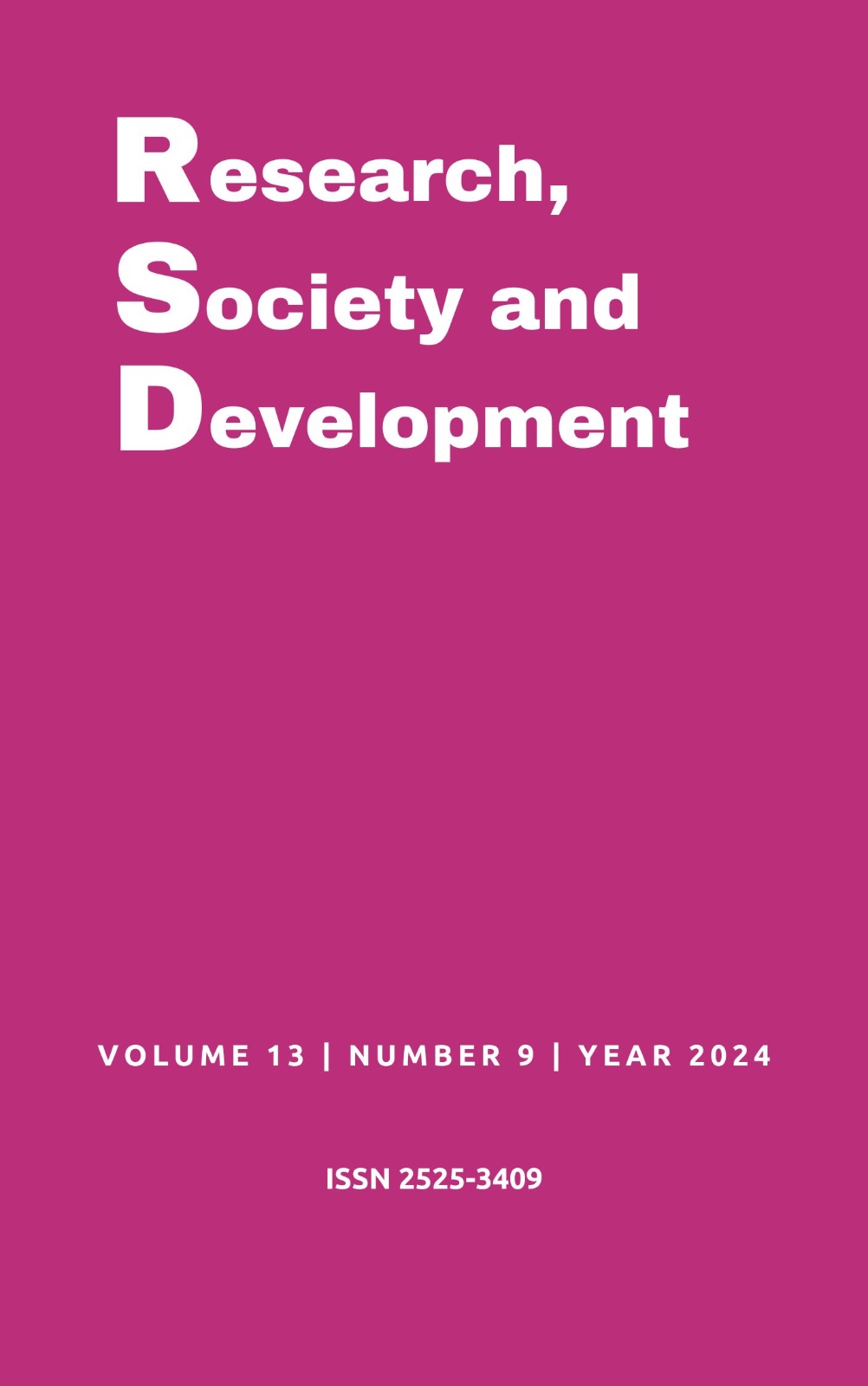Condição mental e emocional de estudantes de engenharia de uma universidade pública durante a pandemia da Covid-19
DOI:
https://doi.org/10.33448/rsd-v13i9.46566Palavras-chave:
Ansiedade, Condição mental, Estudantes, Estresse, Pandemia, Covid-19.Resumo
O evento da pandemia da Covid-19 causou alterações psicológicas em universitários. O objetivo desta pesquisa foi realizar uma análise da condição mental dos estudantes de engenharia de uma universidade pública federal durante a pandemia da Covid-19, buscando compreender os fatores estressores que impactam na vida dos discentes. A amostra foi de 100 estudantes, regularmente matriculados, que assinaram o Termo de Consentimento Livre e Esclarecido (TCLE) e responderam a um questionário sociodemográfico e de condição mental e emocional e ao Self Report Questionnare (SQR-20). Os resultados obtidos mostraram que 87% da amostra apresentou algum tipo de transtorno psíquico menor. As comparações nas escalas de condição mental e emocional mostraram que a pandemia e a continuidade do ensino foram fatores relevantes para as alterações nos níveis de estresse e ansiedade, que já se encontravam em níveis que evidenciavam alterações nas condições mentais e emocionais dos voluntários. Evidenciou-se, efeitos psicológicos negativos, cansaço físico e mental para a saúde dos estudantes, associados a um acúmulo de carga horária e a presença de ideação suicida em 13% da amostra. Portanto, fatores decorrentes da adoção do ensino remoto bem como acúmulo de carga horária semestral somada as condições decorrentes da pandemia da Covid-19 fizeram aflorar fragilidades e deficiências estruturais.
Referências
Ahmed H, Allaf M, & Elghazaly, H. (2020) COVID-19 and medical education. Lancet Infect Dis. 20(7):777-8. https://doi.org/10.1016/S1473-3099(20)30226-7
Amaral-Prado, H. M. et. al. (2020) Impacto do confinamento no comportamento psicossocial devido COVID-19 entre membros de uma universidade brasileira. Int. J. Soc. Psiquiatria 20764020971318
Arnett, J. J.(2007). Emerging Adulthood: What Is It, and What Is It Good For? Child Development Perspective, 1(2), 68-73.
Bayram, N. & Bilgel, N. (2008). The prevalence and socio-demographic correlations of depression, anxiety and stress among a group of university students. Social Psychiatry and Psychiatric Epidemiology. 43(80, 667-72).
Brasil. Ministério da Educação. Coronavírus: monitoramento das instituições de ensino. Portal do Ministério da Educação. Brasília, DF, 2020f. http://portal.mec.gov.br/coronavirus/
Cerchiari, E. A. N.. (2004) Saúde mental e qualidade de vida em estudantes universitários. 2004. 283p. Tese (doutorado) - Universidade Estadual de Campinas, Faculdade de Ciências Médicas, Campinas, SP.
Del’omo, F. S., & Cervi, T. M. D. (2017) Sofrimento Mental e Dignidade da Pessoa Humana: os desafios da reforma psiquiátrica no Brasil. Sequência (Florianópolis), (77), 197-220
Esteves C. S., Oliveira, C. Rosa de, & Argimon,I. I. L.(2021) Social Distancing: Prevalence of Depressive, Anxiety, and Stress Symptoms Among Brazilian Students During the COVID-19 Pandemic. Front Public Health. (8), 589966
Faro, A. et al. (2020) COVID-19 e saúde mental: a emergência do cuidado. Estud. psicol. 37, e200074.
Gatti, B. A. (2004) Estudos quantitativos em educação. Educação e Pesquisa, 30(1), 11-30.
Gusso, E. L. et al. (2020) Ensino Superior em tempos de pandemia: diretrizes à gestão universitária. Debates & polêmicas. Educ. Soc. 412020 https://doi.org/10.1590/ES.238957de Maia e Dias (2020)
Hersi, L. et al. (2017) Mental distress and associated factors among undergraduate students at the University of Hargeisa, Somaliland: a cross-sectional study. International Journal of Mental Health Systems 11(39)
Ivashita, S. B; Faustino, R. C., & Silva, M. L. N. (2021) Ensino Remoto durante a pandemia da covid-19 na universidade estadual de londrina. Temas & Matizes, 14(25), 70–83.
Koche, J. C. (2011). Fundamentos de metodologia científica. Vozes.
Knechtel, M. R. (2014) Metodologia da pesquisa em educação: uma abordagem teórico-prática dialogada. Curitiba, PR: Intersaberes. Práxis Educativa, Ponta Grossa, 11(2), 531-534
Lipp, M. E. N. (1996) Stress: Conceitos Básicos In: LIPP, M. (Org.) Pesquisas Sobre Stress no Brasil: saúde, ocupações e grupos de risco. Papirus/Editora São Paulo, 1996.
Maia, B. R., & Dias, P. C. (2020) Ansiedade, depressão e estresse em estudantes universitários: o impacto da COVID-19. Estud. psicol. 37, e200067
Mota, D. C. B. et. al. (2021) Saúde mental e uso de internet por estudantes universitários: estratégias de enfrentamento no contexto da covid-19. Rev. Ciênc. saúde coletiva 26 (6)
Oliveira, E. N. et al (2022). Covid-19: repercussões na saúde mental de estudantes no ensino superior. Saúde Debate. 46(1), 206-220.
Padovani, R. C. et al. (2014) Vulnerabilidade e bem-estar psicológicos do estudante universitário. Rev. Bras.Ter. Cogn., 10(1).
Pereira A. S. et al. (2018). Metodologia da pesquisa científica. UFSM.
Santos, C. R. F. et al. (2022) Significados atribuídos a condição mental e emocional por universitários durante a pandemia da Covid-19. Research, Society and Development, 11(7), e38511729813, 2022
Tasso, A. F. Hisli S. N., & San Roman, G. J. (2021) Ruptura do COVI-19 em estudantes universitários: implicações acadêmicas e socioemocionais. Psychological Trauma: Theory, Research, Practice, and Policy, 13(1), 9-15.
Wang, C. et al. (2020). Immediate Psychological Responses and Associated Factors during the Initial Stage of the 2019 Coronavirus Disease (COVID-19) Epidemic among the General Population in China. International Journal of Environmental Research and Public Health, 17(5), 1729.
Downloads
Publicado
Edição
Seção
Licença
Copyright (c) 2024 Cristine Rodrigues Fernandes Santos; Ronara Cristina Bozi dos Reis; Davidson Passos Mendes ; Geraldo Fabiano de Souza Moraes

Este trabalho está licenciado sob uma licença Creative Commons Attribution 4.0 International License.
Autores que publicam nesta revista concordam com os seguintes termos:
1) Autores mantém os direitos autorais e concedem à revista o direito de primeira publicação, com o trabalho simultaneamente licenciado sob a Licença Creative Commons Attribution que permite o compartilhamento do trabalho com reconhecimento da autoria e publicação inicial nesta revista.
2) Autores têm autorização para assumir contratos adicionais separadamente, para distribuição não-exclusiva da versão do trabalho publicada nesta revista (ex.: publicar em repositório institucional ou como capítulo de livro), com reconhecimento de autoria e publicação inicial nesta revista.
3) Autores têm permissão e são estimulados a publicar e distribuir seu trabalho online (ex.: em repositórios institucionais ou na sua página pessoal) a qualquer ponto antes ou durante o processo editorial, já que isso pode gerar alterações produtivas, bem como aumentar o impacto e a citação do trabalho publicado.


